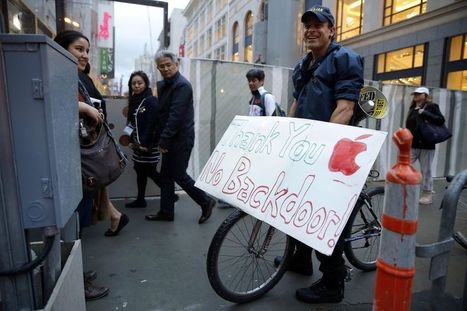On the day Apple announced it would fight a federal court order to build a master key that could grant access to data held on iPhones, dozens of customers flocked to the company’s store downtown. Nearly half of Americans polled recently support Apple’s decision to resist the government’s demand to unlock the iPhone of San Bernardino terror suspect Syed Rizwan Farook, according to a national online survey by Reuters and Ipsos. The case between Apple and the federal government began when a California federal magistrate judge ordered the company on Feb. 16 to disable security functions on Farook’s iPhone that would lock out federal investigators after 10 unsuccessful attempts to guess the suspected gunman’s pass code. Apple CEO Tim Cook refused, saying the case would require the company to create a “backdoor” into the iPhone that could have sweeping implications for security and set a precedent for future government requests to demand greater access to tech companies’ data. Earlier this month, about 40 companies, 32 law professors and several dozen nonprofits and individuals — including the husband of one of the San Bernardino attack victims — filed briefs in support of Apple. The debate between Apple and the FBI has been painted by both sides as a stand-in for the fundamental struggle between national security and civil liberties. On Thursday, federal prosecutors filed a motion that said, “Apple’s rhetoric is not only false, but also corrosive of the very institutions that are best able to safeguard our liberty and our rights.” [...] studies show many Americans simply don’t trust the federal government to keep their information safe. Apple’s design of an operating system that, the company claims, even Apple itself cannot crack was a direct response to consumer fears of surveillance, experts said. Yochai Benkler, a law professor and director of the Berkman Center for Internet and Society at Harvard University, wrote that Apple’s ethic essentially said, You don’t have to trust us; you don’t have to trust the democratic process of our government. Most Americans do not want the government to have access to their phone, communications and Internet activity — even in the name of stopping terror attacks, the Reuters/Iposos poll found. According to Edelman’s annual Trust Barometer study, which measures public confidence in entities such as governments, corporations and the media, most people’s levels of trust haven’t budged since the recent recession. Apple supporters will insist the company is in the right whether they win or the government ultimately prevails and forces the tech giant to turn over the keys to Farook’s iPhone data. A crowd of about 20 people gathered in front of the store and listened as speakers extolled the virtues of Apple’s legal battle with the government.

|
Scooped by Dr. Pamela Rutledge |
No comment yet.
Sign up to comment



 Your new post is loading...
Your new post is loading...







All the hype over "big data" combined with the looming threat of terrorism and the inroads into personal rights with the Patriot Act have created a landscape of fear. The question is, who do you fear most? The current election season is making the government process seem pretty, well, dysfunctional if not downright dangerous. That makes the serenity of an Apple store seem like a temple to the individual. Beliefs are just that, beliefs. The facts don't matter. People tell themselves a story and if it feels right (what Jerome Bruner, my fav cognitive psychologist, calls verisimilitude), then it is right. A story about Apple protecting your data is a much easier one to tell than that the government isn't going to violate your rights. I mean, seriously, who believes they are just going to hack into a phone this one time? I'm not saying which side is right, mind you, I'm just pointing out that Apple has a serious leg up on this narrative space!